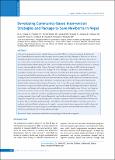Please use this identifier to cite or link to this item:
https://hdl.handle.net/20.500.14356/1981| Title: | Developing Community-Based Intervention Strategies and Package to Save Newborns in Nepal |
| Authors: | KC, A Thapa, K Pradhan, Y V KC, N P Upreti, S R Adhikari, R K Khadka, N Acharya, B Dhakwa, J R Aryal, D R Aryal, S Starbuck, E Paudel, D Khanal, S Devkota, M D |
| Citation: | KCA., ThapaK., PradhanY. V., KCN. P., UpretiS. R., AdhikariR. K., KhadkaN., AcharyaB., DhakwaJ. R., AryalD. R., AryalS., StarbuckE., PaudelD., KhanalS., & DevkotaM. D. (2011). Developing Community-Based Intervention Strategies and Package to Save Newborns in Nepal. Journal of Nepal Health Research Council. https://doi.org/10.33314/jnhrc.v0i0.279 |
| Issue Date: | 2011 |
| Publisher: | Nepal Health Research Council |
| Article Type: | Special Issue Articles |
| Keywords: | Nepal Community based newborn care package Health systems Integration |
| Series/Report no.: | October;279 |
| Abstract: | Abstract In Nepal, the proportion of under 5 deaths that are neonatal (0-28 days) has been increasing in the last decade, due to faster declines in infant and child mortality than in neonatal mortality. This trend is likely due to a focus on maternal and child survival programs that did not adequately address newborn health needs. Policy and actions to save newborn lives resulted from increased attention to newborn deaths in 2001, culminating in the endorsement of the National Neonatal Health Strategy in 2004, a milestone that established newborn health and survival as a national priority. Operationalization of the National Neonatal Health Strategy took place in 2007 with the development of the Community-Based Newborn Care Package (CB-NCP). This paper describes how national stakeholders used global, regional and in-country research and policies to develop the CB-NCP, thus outlining key ingredients to make newborn health programming a reality in Nepal. A technical working group was constituted to review existing evidence on interventions to improve newborn survival, develop a tool to prioritize neonatal interventions, and conduct program learning visits to identify key components appropriate to the Nepal context that should be included in the Community Based Integrated Newborn Care Package. The group identified interventions based on the evidence of impact on newborn survival, potential mechanisms within the existing health system to deliver the interventions, and linkages with existing programs and different tiers of the health system. Not only was Nepal one of the first countries in south-east Asia where government adopted a national strategy to reduce neonatal deaths, but it was also one of the first to endorse a package of neonatal interventions for pilot testing and scaling up through existing community-based health systems that provide basic health services throughout the country. CB-NCP was designed to be gradually scaled up throughout the country by integration with Safe Motherhood and Child survival programs that are currently operating at scale. Under Ministry of health and Population leadership, a network of academia, professional bodies and partners developed a common vision for improving newborn health and survival, and launched district-level pilot programs to demonstrate and learn how newborn health interventions could be effectively and efficiently delivered and scaled up in Nepal Keywords: Nepal, community based newborn care package, health system, integration. |
| Description: | Special Issue Articles |
| URI: | http://103.69.126.140:8080/handle/20.500.14356/1981 |
| ISSN: | Print ISSN: 1727-5482; Online ISSN: 1999-6217 |
| Appears in Collections: | Vol 9 No 2 Issue 19 October 2011 |
Files in This Item:
| File | Description | Size | Format | |
|---|---|---|---|---|
| 279-Article Text-277-1-10-20130822.pdf | Fulltext Download | 791.75 kB | Adobe PDF |  View/Open |
Items in DSpace are protected by copyright, with all rights reserved, unless otherwise indicated.
